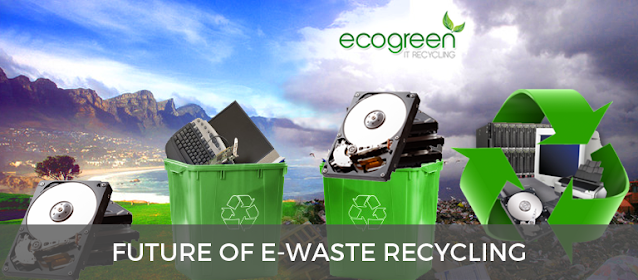 |
| Future of E-Waste Recycling |
Before discussing the future of e-waste recycling, let’s highlight the importance of electronic goods in our lives. It is difficult to imagine a life without electronic gadgets these days. Computers, mobile phones, tablets and other electronic items have become an integral part of our lives. Not only that, we always look to replace these gadgets with new ones after every two years. In short, we cannot even think of surviving without these devices.
It is estimated that almost 40-55 million
tonnes of electronic devices are discarded every year. This volume is expected
to rise in coming years because the demand of these electronic products is on
the increase.
Where
do old items go then?
A very pertinent question, to say the
least. Too many electronic devices end up forgotten somewhere in your drawer.
In fact, if you simply throw them away in garbage, they most definitely end up
being in a landfill. So, if you’re thinking that just throwing them away is the solution, then you
must reconsider. The reason is that filling up of landfills can cause serious
environmental concerns.
Recycling
of e-waste – A potential
resource
Recycling of e-waste is holding great
importance in years to come. Efforts are being made all over the world for a
circular economy and therefore, e-waste is recognised as a potential resource
for the future. According to Professor Lenny Koh of The University of
Sheffield, recycling of e-waste can be worth 3.7 billion euros by the end of
2020 for the European market alone. This shows that e-waste recycling has a
great potential in the future.
Effective
e-waste recycling
Computer recycling is gaining popularity
day by day. Therefore, it is important that effective e-waste recycling
procedures are adopted so that environment can be protected more efficiently. Lot
of research and development is being done globally regarding e-waste recycling.
With increasing volumes of e-waste all around the world, finding effective
e-waste management tools and equipment has become inevitable.
This is where Eco Green IT plays an
important part. As a certified and accredited computer and IT recycling
company, we believe in eco-friendly recycling practices because reducing
landfills and saving the environment is one of our top priorities.
With your support, Eco Green IT can play
its part in reducing e-waste. So, help us protect the environment and avail our
computer recycling services and contribute towards a sustainable future. If you
want read further on this topic, you read this article: Future of e-waste Recycling
Comments
Post a Comment